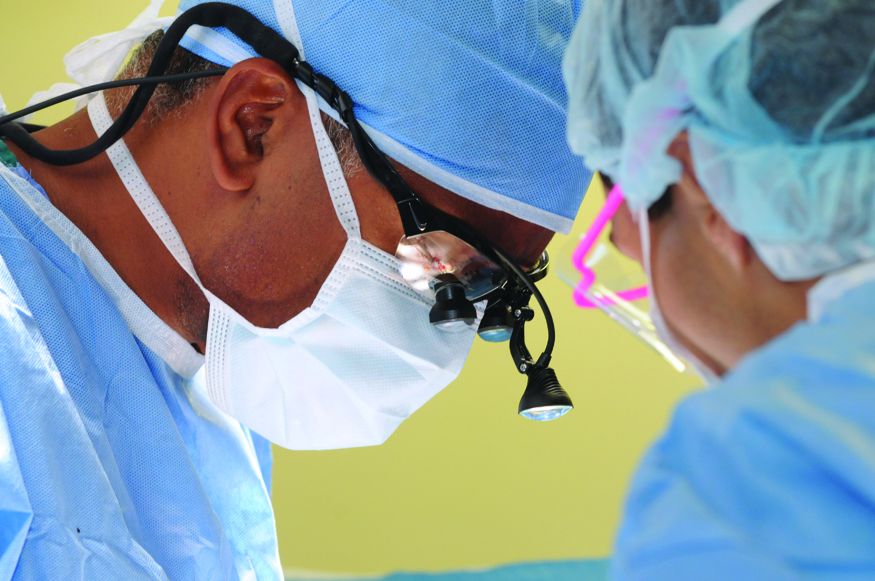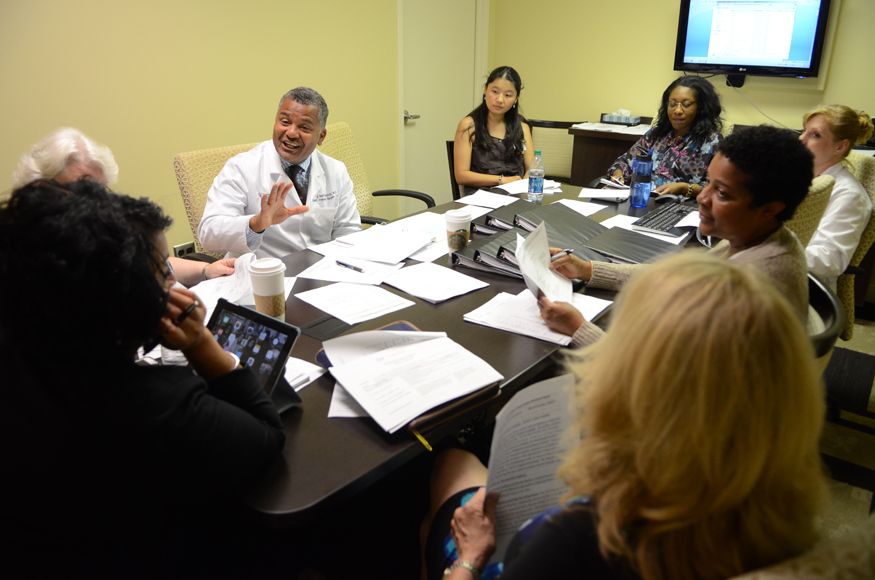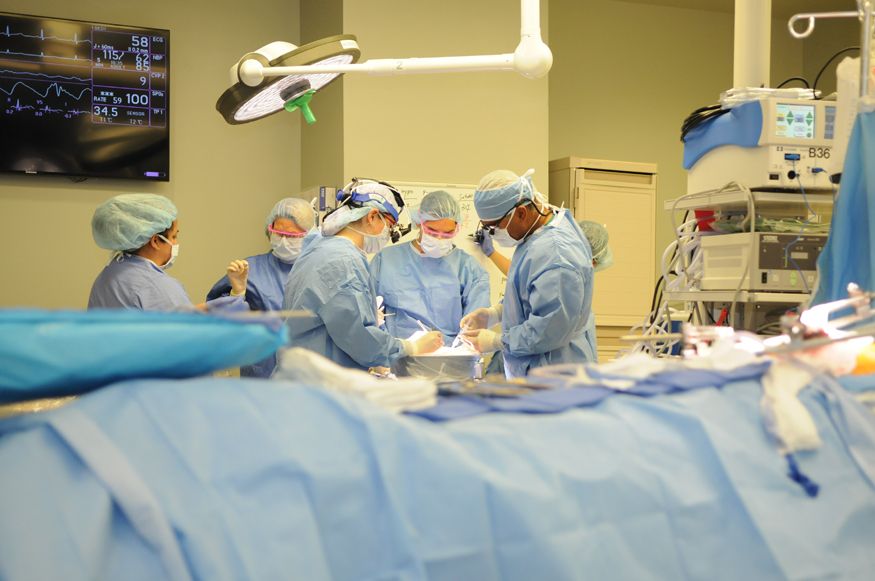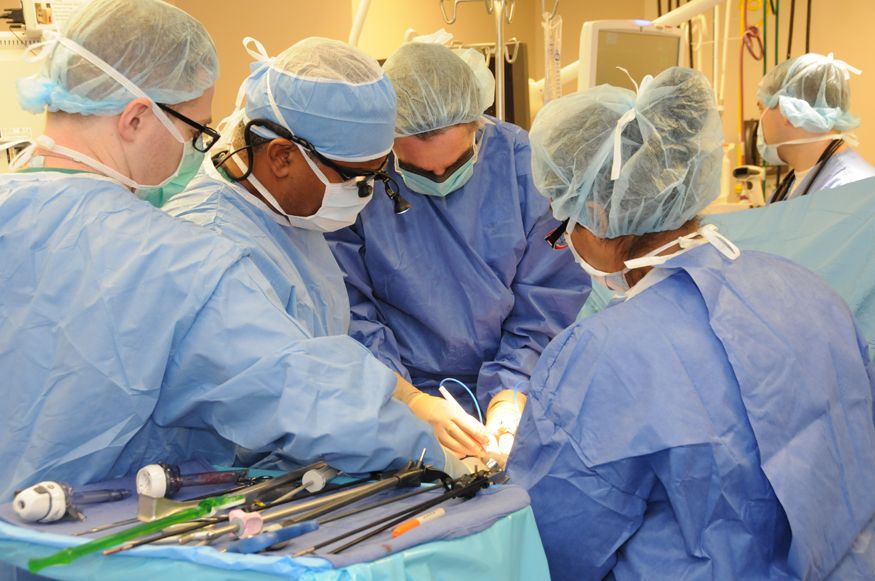Laurie Miller smiles and says, “I’ve had good people [around me]. A lot of good people.”
Miller has a history of lupus and associated kidney disease, and she has twice received kidneys from “good people”: her first donation came from her oldest brother, a pediatric nephrologist, in the 1990s; her second came from her husband in 2015. And lucky for Miller, she had a third good person in her life: Keith Melancon, MD, chief of the Division of Transplant Surgery, director of the Transplant Institute at George Washington University (GW) Hospital, and professor of surgery at the GW School of Medicine and Health Sciences.
Melancon specializes in the difficult cases, those outside of a standard donor-to-patient, compatible process. Patients who present with complex cases, such as Miller, usually come to him through word of mouth thanks to his outreach and the reputation he’s built as a doctor willing to take on a challenge.
“They’ve heard we are more likely to help people to go through transplants who have been turned down at other centers,” says Melancon, who also serves as the director of the Ron and Joy Paul Kidney Center. Oftentimes, he continues, patients are rejected for transplants because of ABO incompatibility or desensitization.
ABO incompatibility, Melancon explains, happens when a potential donor has a different blood type than the potential recipient. Historically in the United States, those with blood type B, for example, could only receive a kidney from others with blood type B. “However, we figured out that people of different blood types can sometimes donate to one another,” he says. “That becomes important, because with transplants, you want to have every possible option. This has a little bit of an ethnic implication because people who are Asian or African American are much, much more likely to be blood type B. However, people who are donors [tend to be] blood type O or A.”
According to Melancon, African Americans only make up 12% of the population, yet they constitute more than a third of patients who need transplants. African Americans are significantly more likely to have chronic kidney disease than Caucasians, according to the National Institutes of Diabetes and Digestive and Kidney Diseases, and Washington, D.C., ranks high for risk factors for kidney disease such as diabetes, high blood pressure, and cardiovascular disease. Plus, those with blood type B tend to have a longer wait time on kidney donation lists — seven or eight years versus the typical four to six — but half of the patients who need a kidney will not survive past four years. The solution, he says, involves two methods: extra medications and plasma exchange, or plasmapheresis, a way of cleaning the blood.
“I don’t think other transplant organizations would have taken me on,” Miller says. “I think the fact that [Melancon] looked at the situation and said to himself, ‘We can do this,’ is a testament to his expertise.”
To understand the methods, which are also used for desensitization, it’s necessary to understand how proteins in the body work, Melancon says. Proteins, he explains, help the body to fight off infection, or “foreign invaders,” by recognizing and coating those invaders with targets, or antibodies, so cells can kill them. “You cannot live without your immune system doing this,” he explains. “The hallmark for doing this is called HLA: human leukocyte antigens, which are proteins. The human leukocyte antigens are the fingerprint to your immune system.”
With transplants, however, “we are trying not to have your immune system attack something that is foreign,” Melancon notes. The complicating factor, he adds, is that many patients with kidney disease receive blood transfusions, which means the body receives cells with a different “fingerprint.” Patients can also be put on dialysis, which activates HLA to attack those different fingerprints. “When that happens, a person becomes what we call ‘sensitized,’ ” he says. The subsequent medications and plasma exchange help to desensitize patients by getting rid of antibodies, which are what coat the cells that HLA targets.
“In order to have compatible transplants, meaning you don’t reject the transplant out of hand, you have to reduce the ability of the receiving patient to have a rejection. And that’s what desensitization is all about,” Melancon says.
Miller, with her second transplant, struggled with rejection, among other complications, but the care from Melancon and his team helped her to recover. “It was a long haul after the transplant to get me through [my] issues,” she says. “Dr. Melancon and his team were just amazing. I was able to go back to work for a while, and I’m able to do a lot now that I may not have been able to do without the transplant. So, I feel like my quality of life is still pretty darn good, considering.”
Miller pauses, catching her breath, and pushes through tears to explain that she’s since left her career as a lobbyist due to other health concerns, but, adds that her kidneys are healthy.
“I don’t think other transplant organizations would have taken me on,” she says. “I think the fact that [Melancon] looked at the situation and said to himself, ‘We can do this,’ is a testament to his expertise.”







